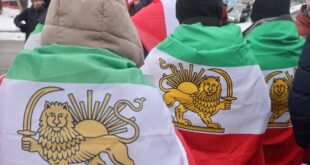WASHINGTON — US President George W. Bush already has made significant concessions as part of a major power offer to end the Iran nuclear crisis.
But will he give on the crucial demand for a full suspension of Tehran’s uranium enrichment activities, which is key to whether negotiations even begin? In effect, “talks about talks” are already under way.
The details of the package put to Iran by the United States and other major powers last week “are far less important than this struggle over conditions for starting the talks,” said Gary Samore, a non-proliferation expert who was a senior adviser to former president Bill Clinton.
“The real focus of all the diplomatic energy right now is over this question of suspension” of nuclear enrichment. It could soon present the White House with a difficult choice, whether to compromise more or move toward sanctions, Samore said in an interview.
A sworn foe of Iran since the 1979 Islamic revolution, Washington recently agreed to negotiate directly with Tehran on the nuclear issue in a process that includes Britain, France, Germany, Russia and China.
The six offered Iran incentives to give up the possibility of producing nuclear arms, including light-water nuclear power reactors, guaranteed nuclear fuel and expanded trade benefits — all of which Bush had long opposed.
But first, the major powers insist that Iran verifiably halts all uranium enrichment-related and reprocessing activities which are essential to producing nuclear fuel.
The United States and its partners accuse Iran, the world’s fourth-largest oil exporter, of building nuclear weapons, while Tehran maintains it only aims to produce civilian nuclear power to meet the country’s growing energy needs.
High distrust
Because Iran concealed its nuclear activities from the International Atomic Energy Agency for nearly 20 years, distrust is high.
The Americans fear Iran will use negotiations to buy time until they achieve a point-of-no-return level of nuclear knowledge and capacity, perhaps by year’s end. As a result, the six powers are pressing Iran for an answer by mid-July.
Iran on Sunday gave its most negative assessment of the package, saying it contained “problems” and Tehran would respond with its own proposals.
Iran usually refers to uranium enrichment as a national right. Since announcing in April that Iran had enriched uranium in small quantities, Iranian officials have often insisted Tehran would not now give up this work.
Some Iranian officials have hinted, however, their government might negotiate over plans for industrial-scale enrichment in favour of retaining a smaller-scale research and development programme.
Samore said Russia would be a key player. “If the Russians are prepared to threaten sanctions over the issue of full suspension [of nuclear enrichment], I could see Iran taking a pause,” he said.
US officials insist the major powers agree that suspension means full suspension and Washington, at least, will hold firm. “There is no point in engaging in a negotiating process if Iran can continue to make progress on their nuclear programme … You don’t want them to be able to get good at it,” one senior US official said.
American hardliners largely have muted their misgivings over the concessions Bush has already offered. However, if the president budges on the demand for a full suspension of nuclear enrichment activities, “the rightwing will go crazy,” said former UN weapons inspector David Albright of the Institute for Science and International Security.
Bush had little choice but to enter negotiations and many expect he will come under increasing pressure to concede more.
“We’re more vulnerable than they are, and they know it.
They’re going to have 20, 30 nuclear weapons five years from now. This is not a time for military threats, this is a time to build alliances,” retired General Barry McCaffrey said on Sunday on NBC’s “Meet the Press.”
 Eurasia Press & News
Eurasia Press & News



